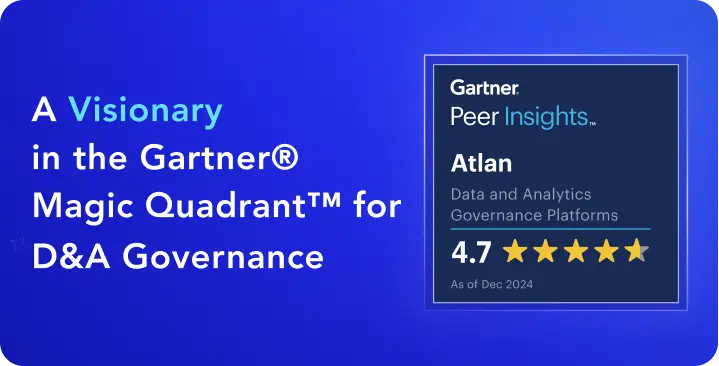Data Compliance Management in Fintech: Your Complete Guide in 2025
Share this article
Data compliance management in fintech safeguards data privacy, security, and integrity while mitigating risks, maintaining customer trust, and minimizing legal or financial risks.
See How Atlan Simplifies Data Governance – Start Product Tour
This article will explore the role of data compliance management in fintech and highlight strategies to effectively manage data compliance in a complex landscape.
Table of Contents #
- What is data compliance management in fintech?
- Why do you need data compliance management in fintech?
- Who is responsible for data compliance in fintech?
- How to tackle data compliance management in fintech
- Data compliance management in fintech: Core capabilities
- Building trust through secure data compliance management in fintech
- Data compliance management in fintech: Related reads
What is data compliance management in fintech? #
Data compliance management in fintech involves implementing processes, tools, and strategies to ensure that financial technology organizations comply with data regulations, standards, and policies.
This includes managing the collection, storage, processing, and sharing of sensitive financial and personal data in alignment with legal requirements and other industry-specific standards.
Beyond regulatory fines, compliance is key to business growth and resilience in fintech. For example, fintech companies expanding into new markets must prove robust data compliance to meet region-specific regulations like GDPR in Europe or CCPA in California.
Without a strong compliance framework, securing partnerships, processing cross-border transactions, and gaining customer trust becomes significantly more challenging.
Why do you need data compliance management in fintech? #
Data compliance management is crucial in fintech to tackle:
- Regulatory complexities: Fintech companies navigate an intricate regulatory landscape, often spanning multiple jurisdictions with distinct compliance requirements. A single fintech firm may need to comply with diverse data protection laws—such as GDPR in Europe and CCPA in California—based on its geographic footprint.
- Industry standards: Meeting industry standards significantly enhances a fintech organization’s credibility and demonstrates its commitment to compliance. Frameworks like PCI DSS ensure secure payment transactions, while AML regulations help prevent financial crimes, fostering trust with customers, regulators, and partners.
- Financial implications: Companies can face severe financial penalties, sometimes reaching billions of dollars for serious compliance failures. For example, fintech firms handling EU citizens’ data must comply with GDPR mandates even if they operate outside the EU. Non-compliance could result in fines of up to €20 million or 4% of annual global turnover.
- Operational impact: Non-compliance can trigger regulatory audits, sanctions, or even forced suspension of operations in specific markets, which can disrupt business continuity. Regulatory fines and remediation efforts also divert resources away from innovation, slowing down product development and market expansion.
- Reputational damage: Regulatory violations and data breaches erode customer trust, damaging a fintech company’s brand and market position. A single compliance failure—such as a data leak exposing sensitive customer information—can trigger negative press, legal battles, and customer churn.
Who is responsible for data compliance in fintech? #
The responsibility for data compliance management in fintech can be shared across multiple teams, including legal, compliance, IT security, data governance, and business operations. Let’s have a closer look at the key roles responsible for ensuring compliance:
- Head of Compliance / Chief Compliance Officer: They oversee the organization’s entire compliance framework and lead the fintech firm’s compliance strategy.
- Data Protection Officer (DPO): The DPO oversees the protection of customer data and ensures that fintech operations align with global data privacy laws.
- Legal teams: They ensure that an organization’s data management practices comply with applicable laws and regulations.
- IT and data management teams: They’re responsible for securing data storage systems, establishing secure data transfer protocols and managing data access permissions. They also oversee data architecture design and provide the technical foundation for compliance initiatives and data protection frameworks.
- Data governance teams: They manage an organization’s data assets, define data standards and policies, maintain metadata repositories and ensure that data flows are transparent through data lineage mapping.
- Compliance managers: Compliance managers handle the operational aspects of the organization’s compliance efforts–performing routine compliance audits, monitoring regulatory changes, ensuring compliance documentation is thorough and updated, etc.
- Data product managers: Data product managers bridge the gap between compliance teams, engineers, and business stakeholders to ensure data privacy, security, and governance are integrated into product design.
It’s important to note that roles in data compliance management vary by organization, influenced by size, regulations, governance maturity, and data complexity. Some fintech companies consolidate responsibilities into single roles, while others distribute them across teams, adapting to evolving compliance needs and business priorities.
How to tackle data compliance management in fintech #
Managing data compliance effectively requires a proactive approach and fintech companies should focus on four key aspects:
- Understand the key data compliance regulations in fintech
- Standardize your data estate and evaluate it for compliance gaps
- Establish a single source of truth for compliance requirements
- Leverage automation and AI for large-scale data compliance management
1. Understand the key data compliance regulations in fintech #
To manage data compliance effectively, knowing the relevant regulations is essential. Here’s a quick overview of some of the key regulations in fintech:
- The General Data Protection Regulation (GDPR): The GDPR, implemented in 2018, fundamentally shapes how companies handle EU residents’ personal data. Consider a Polish bill-splitting payment app. GDPR compliance would include elements, such as obtaining explicit consent for location data usage, providing users with portable transaction histories, and deleting all data upon request (right to be forgotten). Separate permissions are required for any secondary use of data, such as personalized marketing.
- California Consumer Privacy Act (CCPA): CCPA compliance involves ensuring the protection of personal information and the upholding of data rights granted to California residents. For example, consider a ride-sharing app operating in California. Under the California Consumer Privacy Act (CCPA), this app must inform the user about categories of personal information collected, like contact information and payment details, before or at the point of collection.
- Payment Card Industry Data Security Standard (PCI DSS): PCI DSS focuses on securing payment card transactions. It mandates robust encryption, regular security audits, and network monitoring to prevent payment fraud. For a fintech payment gateway, PCI DSS compliance would require encrypting credit card data during transactions and conducting regular penetration testing to identify vulnerabilities.
- Digital Personal Data Protection Act (DPDP Act): India’s DPDP Act obliges businesses to obtain informed customer consent before collecting personal data, maintain transparency in data processing, and provide mechanisms for grievance redressal. So, a fintech firm offering digital payment solutions in India must revamp its consent mechanisms to ensure customers understand how their payment data will be stored, processed, and shared.
2. Standardize your data estate and evaluate it for compliance gaps #
Standardizing your data estate ensures that data across all platforms—whether transactional systems, customer databases, or payment gateways—follows a unified framework.
Fintech companies should implement standardized data definitions, classification protocols, and access controls to maintain consistency across regions and regulatory environments.
They should also check whether:
- Access controls, encryption, and data retention policies align with data-specific regulations
- Structured and unstructured data is properly classified for improved security and compliance
- Data lineage paints a complete picture of data flow throughout their data estate
- Automated data quality checks identify inconsistencies and errors in real time
- Compliance reporting mechanisms ensure audit readiness and regulatory transparency
Here’s how Tala, a fintech company with eight million customers, leveraged data lineage to improve understanding and trust of their data estate.
“[Business users] can go to the lineage page to see how one table is related to another table and what are the codes that generate the table. It [fully automated lineage] has been very helpful in data exploration when someone is not familiar with a new data source.” - Tina Wang, Analytics Engineering Manager at Tala
3. Establish a single source of truth for compliance requirements #
A fragmented data landscape makes compliance monitoring in fintech complex, increasing the risk of errors, security vulnerabilities, and regulatory breaches. Fintech companies must establish a single source of truth to ensure compliance, IT, legal, and data governance teams work with consistent, up-to-date policies and data classifications.
A unified data and metadata control plane enables seamless compliance management by centralizing data ownership, tagging, classification, column-level lineage tracking, role-based access controls, 360° data profiles, and automated audit logs.
Also, read → The unified control plane in action
4. Leverage automation and AI for large-scale data compliance management #
Automation and AI-driven solutions streamline compliance by:
- Automatically identifying, classifying, and tagging sensitive financial data to meet GDPR, CCPA, PCI DSS or AML requirements
- Enforcing real-time access controls, data masking, and encryption to protect transactions and prevent unauthorized access
- Generating compliance reports, audit trails, and risk assessments with minimal manual effort to ensure continuous regulatory compliance
For instance, UK-based financial enterprise Tide significantly reduced the time required to classify personal data from an estimated 50 days to just 5 hours using automation.
Automating this aspect of GDPR compliance also improved collaboration between data and legal teams, ensuring a unified understanding of personal data and reducing the risk of human error.
Read more → Tide’s story of GDPR compliance
Data compliance management in fintech: Core capabilities #
To establish a strong compliance framework, fintech companies must invest in the following core capabilities:
- Active metadata management: Automatically capture, describe, manage, and sync all types of metadata (including custom metadata across payment systems, financial transactions, etc.), making it easier to find, use, and govern all fintech data. If you use a platform like Atlan, you can also ensure that your fintech data assets are enriched with business context and security details, making each asset well-documented and easy to trace.
- Automated cross-system, column-level data lineage mapping: Understanding how data moves through systems is crucial to map out data transformations and pinpoint compliance vulnerabilities. Automated, cross-system data lineage helps identify compliance risks and ensure data accuracy in upstream and downstream systems.
- Role-based access controls and identity management: Personalize access control based on user roles, personas, data domains, or projects to manage who can view, edit, or delete data.
- Unified policy management and transparency center: Setup integrated policy enforcement with a real-time compliance dashboard. This helps you define and automate compliance rules aligned with industry standards like GDPR, CCPA, or FINRA.
- Automated audit trails and reporting: Streamline compliance documentation, risk assessments, and audit readiness with automated reporting aligned with global financial regulations such as PCI DSS, GDPR, and AML directives. Automation reduces manual oversight and flags discrepancies in real-time.
- Data contracts: Define clear agreements between financial data producers and consumers to standardize expectations, data integrity requirements, and governance practices across fintech platforms.
- Integration across your fintech data stack: Set up a control plane that integrates with various data sources and platforms—both on-prem and in the cloud—providing a unified view. This interoperability eases the burden on data practitioners, who can spend less time hunting for data and more time deriving actionable insights while staying compliant.
Building trust through secure data compliance management in fintech #
Data compliance management in fintech is needed to build trust with customers, regulators, and stakeholders. By implementing a comprehensive set of strategies and capabilities, fintech companies can ensure the secure and responsible handling of sensitive financial data.
Fintech companies that prioritize data security and regulatory adherence demonstrate a strong commitment to protecting user privacy, mitigating financial fraud, and maintaining the highest ethical standards in financial operations.
Data compliance management in fintech: Related reads #
- Data Compliance Management in 2025
- What is Data Governance? Its Importance, Principles & How to Get Started?
- Data Governance and Compliance: An Act of Checks & Balances
- Data Governance and GDPR: A Comprehensive Guide to Achieving Regulatory Compliance
- Financial Data Governance: Strategies, Trends, Best Practices
- The Importance of Data Quality in Financial Services: 5 Reasons
- Achieving HIPAA Compliance with Data Governance
- BCBS 239 Data Governance: What Banks Need to Know in 2025
- BCBS 239 Compliance: What Banks Need to Know in 2025
- FRTB Compliance: Exploring the 6 Core Pillars, Benefits, Impact
- IFRS 17 Compliance: Requirements, Benefits & More
- Data Governance & Business Intelligence: Why Their Integration Matters and How It is Crucial for Business Success?
Share this article











